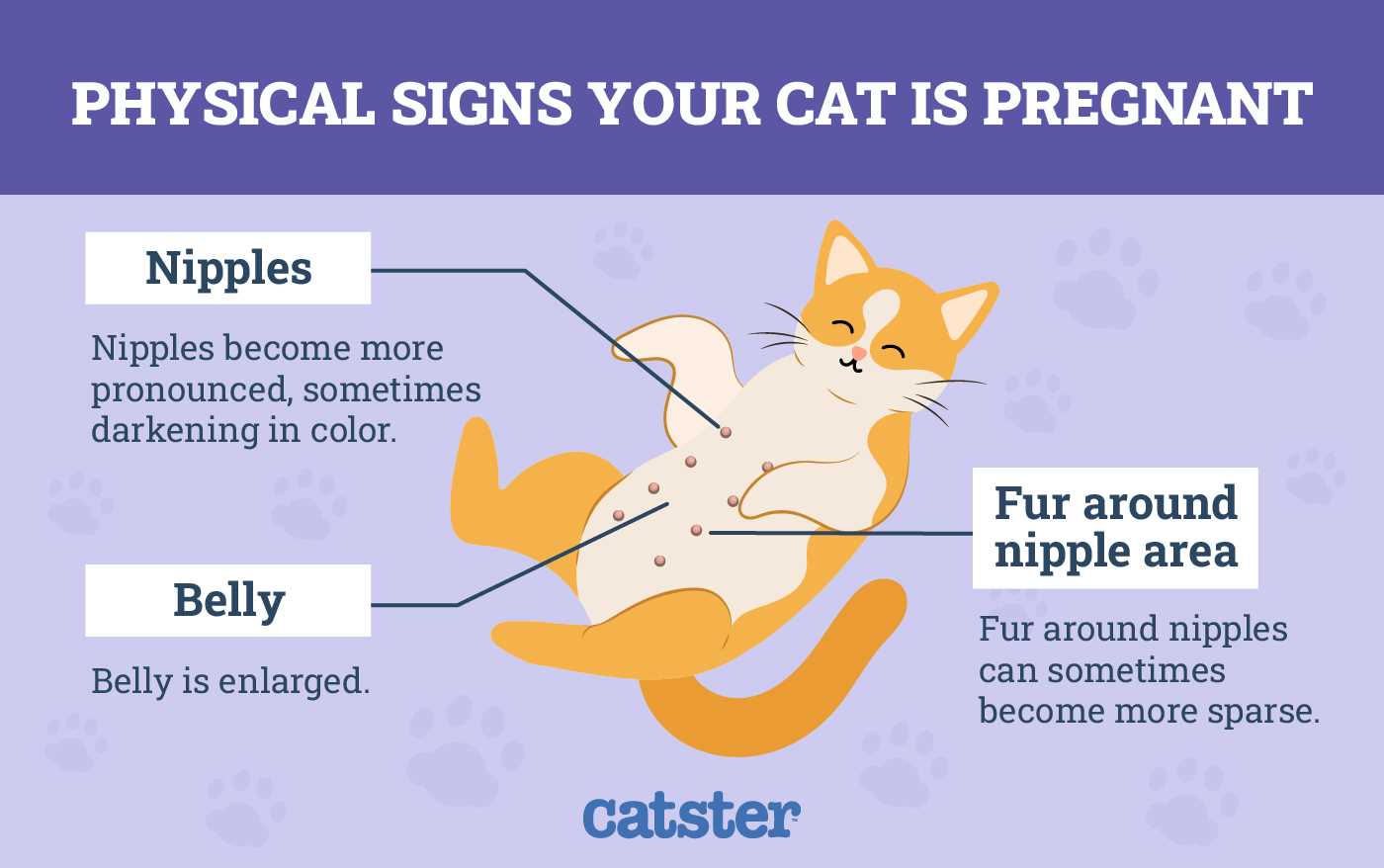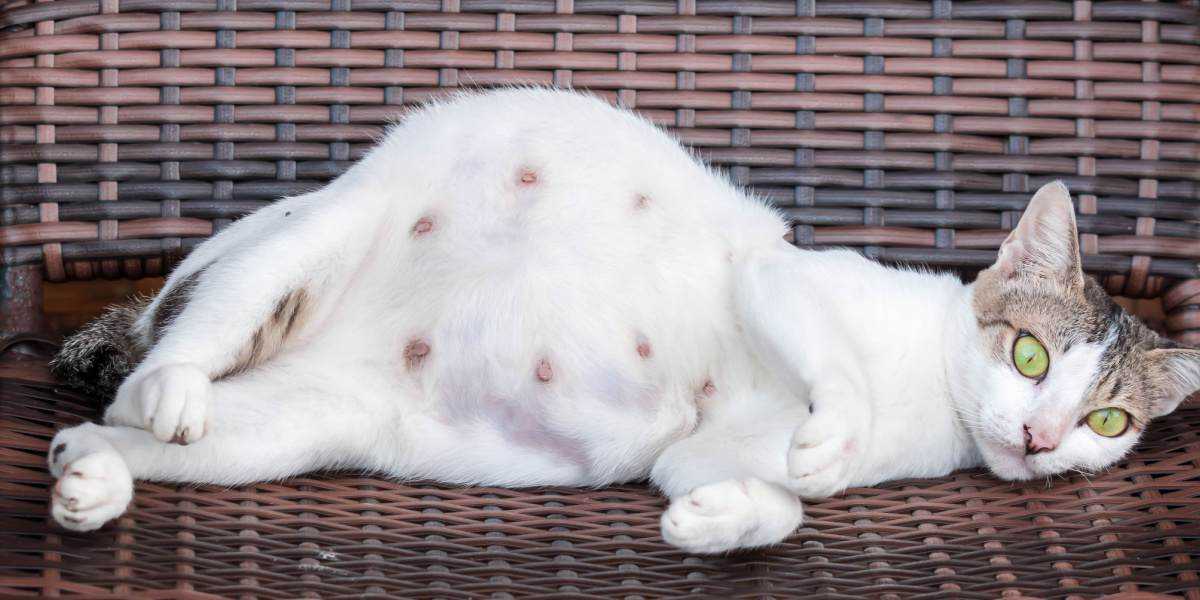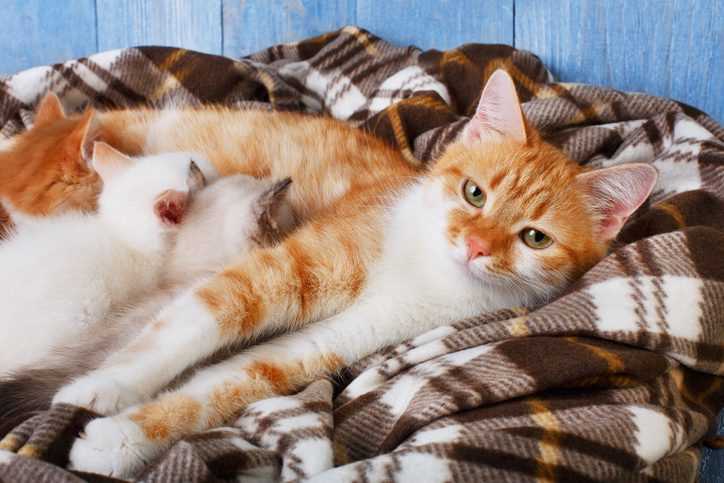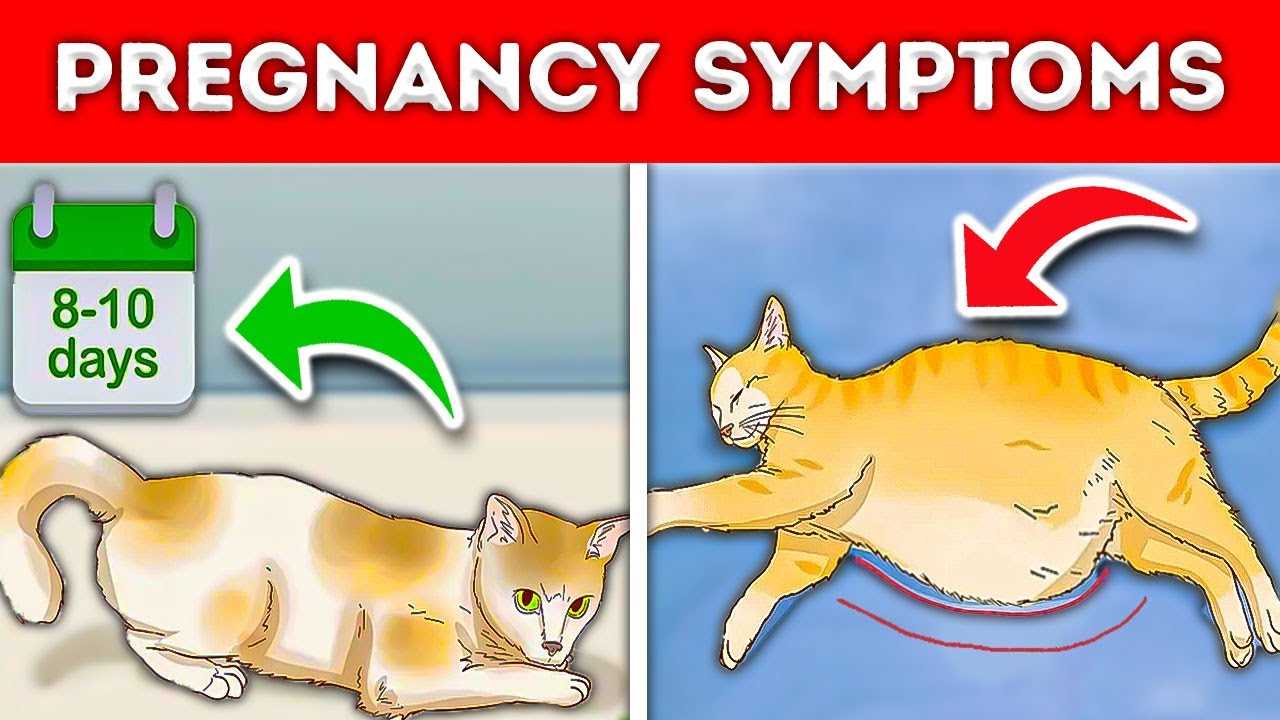At approximately five weeks into pregnancy, expectant mothers begin to display noticeable signs of their condition. This is the time when physical changes become apparent. You might observe a slight increase in belly size, along with changes in behavior and appetite. It’s crucial to provide a comfortable and safe environment during this period.
By around six weeks, the transformation can become more pronounced. You may notice a more rounded abdomen and an increase in nesting behaviors. It’s common for them to seek out cozy spots for rest. Ensuring access to high-quality nutrition is vital at this stage to support both mother and developing kittens.
As the weeks progress, by the eighth week, the signs are unmistakable. The belly will be significantly larger, and the expectant mother may become more vocal or affectionate. Monitoring her health and well-being is essential, along with preparing for the arrival of the little ones. Regular veterinary check-ups can help address any concerns that arise during this important time.
Understanding Pregnancy Stages

In the early phase, noticeable changes might not be apparent. By the third week, increased appetite and slight weight gain may occur. It’s common for females to exhibit behavioral shifts, such as seeking more affection or displaying nesting behaviors.
During weeks four to five, the physical signs become more evident. A slight bulge in the abdomen can be observed, and mammary glands may begin to swell. This is the time to prepare a comfortable space for her, as she might start seeking out cozy areas to rest.
As the sixth week approaches, further significant changes will arise. The abdomen expands considerably, and she may become more lethargic. Providing a quiet, safe environment is essential during this stage. Regular vet check-ups are advisable to monitor health and development.
In the final weeks, especially the last week, the appearance of milk may indicate that delivery is near. Female behavior could shift dramatically, as she becomes restless or anxious. Ensure that her birthing area is ready and free from disturbances.
Keeping her nourished and safe is vital throughout this process. For those with outdoor access, consider strategies like how to keep racoons away from cat food to prevent unwanted visitors.
Physical Signs of Pregnancy in Cats

Notice changes in appetite; many experience increased hunger, while some may eat less than usual. This can vary throughout the gestation period.
Watch for behavioral shifts. A normally social feline may seek solitude, while others become more affectionate, wanting extra attention.
Observe the abdomen; it may begin to swell around the third week. By the fourth week, noticeable changes are often visible.
Check for changes in the nipples. They may become rosier and more prominent as the pregnancy progresses, indicating hormonal shifts.
Be aware of morning sickness; some may exhibit vomiting or lethargy during the initial weeks.
Monitor for nesting behavior, especially as the due date approaches. Preparing a comfortable space for her future kittens becomes instinctual.
Consult a veterinarian for confirmation and guidance, ensuring she receives proper care throughout this period.
Behavioral Changes During Pregnancy

During pregnancy, noticeable shifts in behavior occur. Increased affection is common; expect more purring and rubbing against you. This is her way of seeking comfort and reassurance as her body changes.
Watch for nesting behaviors. She may start selecting cozy spots around the house, gathering blankets or other materials to create a safe environment for her future kittens. It’s essential to provide her with a designated area where she feels secure.
Appetite may fluctuate. Some expectant mothers eat more, while others may experience a decrease in hunger. Keep track of her eating habits and ensure she has access to nutritious food suitable for pregnant felines.
Changes in Activity Level

Activity levels can vary significantly. Some may become more playful, while others prefer to rest. It’s important to observe her energy and adjust playtime accordingly. Gentle play can help maintain her physical health without causing undue stress.
Social Interactions
Social preferences might shift. Some may seek solitude during specific stages, while others will want more interaction. Respect her needs and provide a balance of companionship and personal space.
| Behavior | Description |
|---|---|
| Increased Affection | More cuddling and purring; seeking comfort. |
| Nesting | Gathering materials to create a safe spot. |
| Appetite Changes | Fluctuations in food intake; monitor closely. |
| Activity Level | Varies from playful to lethargic; adjust playtime. |
| Social Interactions | May seek solitude or increased attention; observe closely. |
When to Consult a Veterinarian
Seek veterinary advice immediately if you notice any unusual signs such as excessive vomiting, lethargy, or loss of appetite. Early intervention can prevent complications and ensure the health of both the queen and her kittens.
If the gestation period exceeds 65 days without signs of labor, a check-up is necessary. Delays can indicate potential issues that require professional evaluation.
Regular check-ups during pregnancy are recommended to monitor progress and address any concerns. Vaccinations and parasite control should be updated as advised by the vet.
Observe for any unusual discharge or swelling around the abdomen. These symptoms may warrant an urgent visit. Similarly, if you notice difficulty in breathing or unusual behavior, don’t hesitate to reach out to a veterinary professional.
Always keep the contact information of a trusted vet handy, especially during this critical time. Prompt action can make a significant difference in outcomes for both mother and her offspring.
At approximately five weeks into pregnancy, expectant mothers begin to display noticeable signs of their condition. This is the time when physical changes become apparent. You might observe a slight increase in belly size, along with changes in behavior and appetite. It’s crucial to provide a comfortable and safe environment during this period.
By around six weeks, the transformation can become more pronounced. You may notice a more rounded abdomen and an increase in nesting behaviors. It’s common for them to seek out cozy spots for rest. Ensuring access to high-quality nutrition is vital at this stage to support both mother and developing kittens.
As the weeks progress, by the eighth week, the signs are unmistakable. The belly will be significantly larger, and the expectant mother may become more vocal or affectionate. Monitoring her health and well-being is essential, along with preparing for the arrival of the little ones. Regular veterinary check-ups can help address any concerns that arise during this important time.
Understanding Pregnancy Stages

In the early phase, noticeable changes might not be apparent. By the third week, increased appetite and slight weight gain may occur. It’s common for females to exhibit behavioral shifts, such as seeking more affection or displaying nesting behaviors.
During weeks four to five, the physical signs become more evident. A slight bulge in the abdomen can be observed, and mammary glands may begin to swell. This is the time to prepare a comfortable space for her, as she might start seeking out cozy areas to rest.
As the sixth week approaches, further significant changes will arise. The abdomen expands considerably, and she may become more lethargic. Providing a quiet, safe environment is essential during this stage. Regular vet check-ups are advisable to monitor health and development.
In the final weeks, especially the last week, the appearance of milk may indicate that delivery is near. Female behavior could shift dramatically, as she becomes restless or anxious. Ensure that her birthing area is ready and free from disturbances.
Keeping her nourished and safe is vital throughout this process. For those with outdoor access, consider strategies like how to keep racoons away from cat food to prevent unwanted visitors.
Physical Signs of Pregnancy in Cats

Notice changes in appetite; many experience increased hunger, while some may eat less than usual. This can vary throughout the gestation period.
Watch for behavioral shifts. A normally social feline may seek solitude, while others become more affectionate, wanting extra attention.
Observe the abdomen; it may begin to swell around the third week. By the fourth week, noticeable changes are often visible.
Check for changes in the nipples. They may become rosier and more prominent as the pregnancy progresses, indicating hormonal shifts.
Be aware of morning sickness; some may exhibit vomiting or lethargy during the initial weeks.
Monitor for nesting behavior, especially as the due date approaches. Preparing a comfortable space for her future kittens becomes instinctual.
Consult a veterinarian for confirmation and guidance, ensuring she receives proper care throughout this period.
Behavioral Changes During Pregnancy

During pregnancy, noticeable shifts in behavior occur. Increased affection is common; expect more purring and rubbing against you. This is her way of seeking comfort and reassurance as her body changes.
Watch for nesting behaviors. She may start selecting cozy spots around the house, gathering blankets or other materials to create a safe environment for her future kittens. It’s essential to provide her with a designated area where she feels secure.
Appetite may fluctuate. Some expectant mothers eat more, while others may experience a decrease in hunger. Keep track of her eating habits and ensure she has access to nutritious food suitable for pregnant felines.
Changes in Activity Level

Activity levels can vary significantly. Some may become more playful, while others prefer to rest. It’s important to observe her energy and adjust playtime accordingly. Gentle play can help maintain her physical health without causing undue stress.
Social Interactions
Social preferences might shift. Some may seek solitude during specific stages, while others will want more interaction. Respect her needs and provide a balance of companionship and personal space.
| Behavior | Description |
|---|---|
| Increased Affection | More cuddling and purring; seeking comfort. |
| Nesting | Gathering materials to create a safe spot. |
| Appetite Changes | Fluctuations in food intake; monitor closely. |
| Activity Level | Varies from playful to lethargic; adjust playtime. |
| Social Interactions | May seek solitude or increased attention; observe closely. |
When to Consult a Veterinarian
Seek veterinary advice immediately if you notice any unusual signs such as excessive vomiting, lethargy, or loss of appetite. Early intervention can prevent complications and ensure the health of both the queen and her kittens.
If the gestation period exceeds 65 days without signs of labor, a check-up is necessary. Delays can indicate potential issues that require professional evaluation.
Regular check-ups during pregnancy are recommended to monitor progress and address any concerns. Vaccinations and parasite control should be updated as advised by the vet.
Observe for any unusual discharge or swelling around the abdomen. These symptoms may warrant an urgent visit. Similarly, if you notice difficulty in breathing or unusual behavior, don’t hesitate to reach out to a veterinary professional.
Always keep the contact information of a trusted vet handy, especially during this critical time. Prompt action can make a significant difference in outcomes for both mother and her offspring.
At approximately five weeks into pregnancy, expectant mothers begin to display noticeable signs of their condition. This is the time when physical changes become apparent. You might observe a slight increase in belly size, along with changes in behavior and appetite. It’s crucial to provide a comfortable and safe environment during this period.
By around six weeks, the transformation can become more pronounced. You may notice a more rounded abdomen and an increase in nesting behaviors. It’s common for them to seek out cozy spots for rest. Ensuring access to high-quality nutrition is vital at this stage to support both mother and developing kittens.
As the weeks progress, by the eighth week, the signs are unmistakable. The belly will be significantly larger, and the expectant mother may become more vocal or affectionate. Monitoring her health and well-being is essential, along with preparing for the arrival of the little ones. Regular veterinary check-ups can help address any concerns that arise during this important time.
Understanding Pregnancy Stages

In the early phase, noticeable changes might not be apparent. By the third week, increased appetite and slight weight gain may occur. It’s common for females to exhibit behavioral shifts, such as seeking more affection or displaying nesting behaviors.
During weeks four to five, the physical signs become more evident. A slight bulge in the abdomen can be observed, and mammary glands may begin to swell. This is the time to prepare a comfortable space for her, as she might start seeking out cozy areas to rest.
As the sixth week approaches, further significant changes will arise. The abdomen expands considerably, and she may become more lethargic. Providing a quiet, safe environment is essential during this stage. Regular vet check-ups are advisable to monitor health and development.
In the final weeks, especially the last week, the appearance of milk may indicate that delivery is near. Female behavior could shift dramatically, as she becomes restless or anxious. Ensure that her birthing area is ready and free from disturbances.
Keeping her nourished and safe is vital throughout this process. For those with outdoor access, consider strategies like how to keep racoons away from cat food to prevent unwanted visitors.
Physical Signs of Pregnancy in Cats

Notice changes in appetite; many experience increased hunger, while some may eat less than usual. This can vary throughout the gestation period.
Watch for behavioral shifts. A normally social feline may seek solitude, while others become more affectionate, wanting extra attention.
Observe the abdomen; it may begin to swell around the third week. By the fourth week, noticeable changes are often visible.
Check for changes in the nipples. They may become rosier and more prominent as the pregnancy progresses, indicating hormonal shifts.
Be aware of morning sickness; some may exhibit vomiting or lethargy during the initial weeks.
Monitor for nesting behavior, especially as the due date approaches. Preparing a comfortable space for her future kittens becomes instinctual.
Consult a veterinarian for confirmation and guidance, ensuring she receives proper care throughout this period.
Behavioral Changes During Pregnancy

During pregnancy, noticeable shifts in behavior occur. Increased affection is common; expect more purring and rubbing against you. This is her way of seeking comfort and reassurance as her body changes.
Watch for nesting behaviors. She may start selecting cozy spots around the house, gathering blankets or other materials to create a safe environment for her future kittens. It’s essential to provide her with a designated area where she feels secure.
Appetite may fluctuate. Some expectant mothers eat more, while others may experience a decrease in hunger. Keep track of her eating habits and ensure she has access to nutritious food suitable for pregnant felines.
Changes in Activity Level

Activity levels can vary significantly. Some may become more playful, while others prefer to rest. It’s important to observe her energy and adjust playtime accordingly. Gentle play can help maintain her physical health without causing undue stress.
Social Interactions
Social preferences might shift. Some may seek solitude during specific stages, while others will want more interaction. Respect her needs and provide a balance of companionship and personal space.
| Behavior | Description |
|---|---|
| Increased Affection | More cuddling and purring; seeking comfort. |
| Nesting | Gathering materials to create a safe spot. |
| Appetite Changes | Fluctuations in food intake; monitor closely. |
| Activity Level | Varies from playful to lethargic; adjust playtime. |
| Social Interactions | May seek solitude or increased attention; observe closely. |
When to Consult a Veterinarian
Seek veterinary advice immediately if you notice any unusual signs such as excessive vomiting, lethargy, or loss of appetite. Early intervention can prevent complications and ensure the health of both the queen and her kittens.
If the gestation period exceeds 65 days without signs of labor, a check-up is necessary. Delays can indicate potential issues that require professional evaluation.
Regular check-ups during pregnancy are recommended to monitor progress and address any concerns. Vaccinations and parasite control should be updated as advised by the vet.
Observe for any unusual discharge or swelling around the abdomen. These symptoms may warrant an urgent visit. Similarly, if you notice difficulty in breathing or unusual behavior, don’t hesitate to reach out to a veterinary professional.
Always keep the contact information of a trusted vet handy, especially during this critical time. Prompt action can make a significant difference in outcomes for both mother and her offspring.






